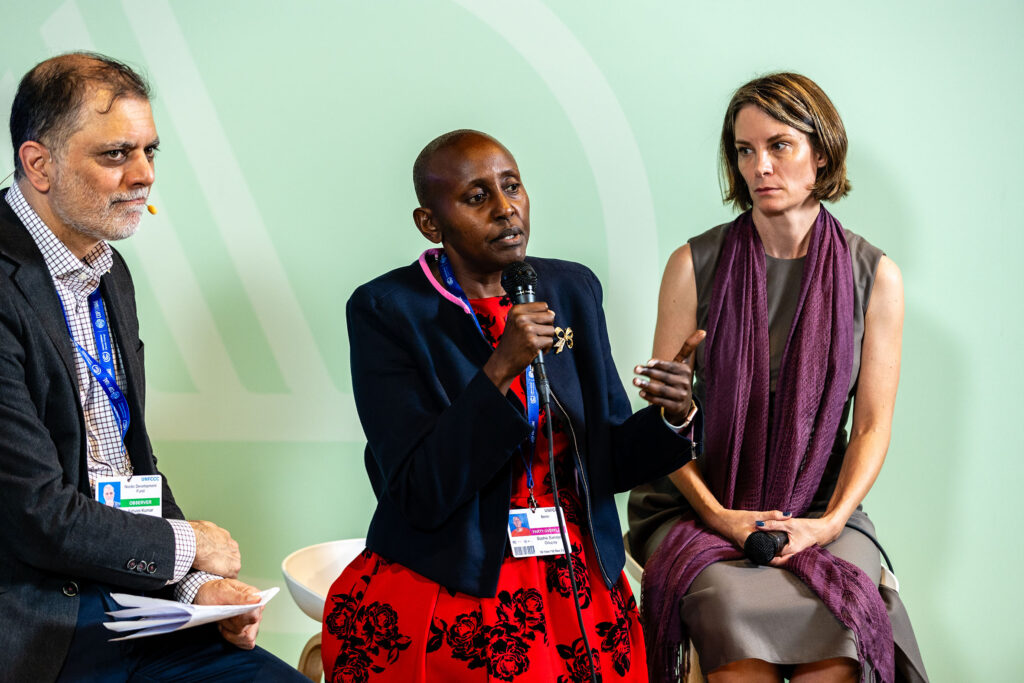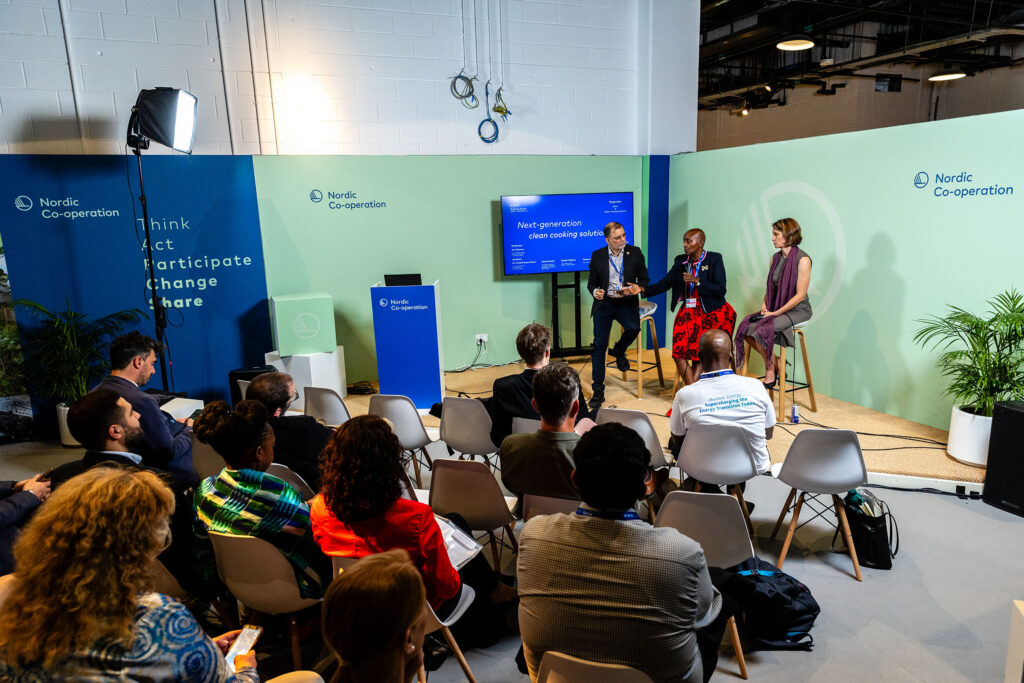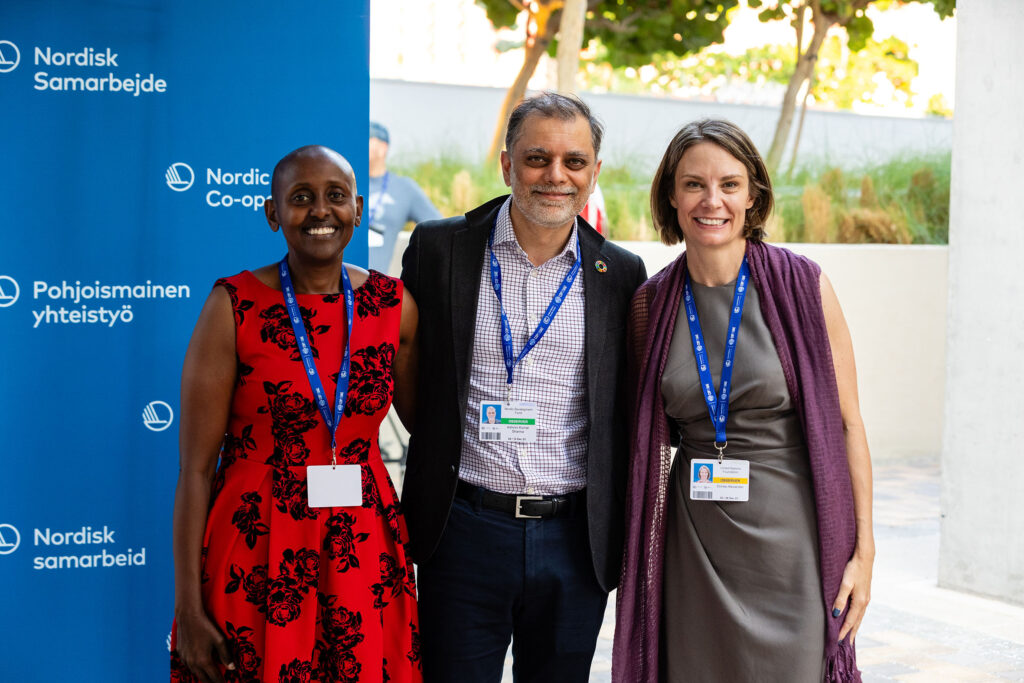- News
Modern Cooking Facility for Africa at COP28: Next-generation clean cooking solutions accelerating the clean energy transition
The shift to clean cooking solutions in Sub-Saharan Africa is crucial for supporting a green energy transition and strengthening climate resilience in Africa. The COP28 side event ‘Next-generation clean cooking solutions’ highlighted the importance of carbon finance, developing new methodologies and incentivising behavioural change with support from local governments.
The side event, organised by Nefco – the Nordic Green Bank – the fund manager of the Modern Cooking Facility for Africa (MCFA), on 4 December 2023 brought together leading practitioners at the Nordic pavilion to discuss the development of the clean cooking sector and how to incentivise the private sector to scale up their high-technology clean cooking solutions to increase climate ambition and accelerate the clean energy transition.

In connection to the event, Norway announced that it is joining the programme as a new donor, providing NOK 200 million, which will increase the programme funding to EUR 61.5 million. “The mandate of MCFA could not be more important and we are delighted that our funding will be put to immediate use, considering the urgent need to scale up clean cooking solutions,” said Per Fredrik Pharo, Director of the Department for Climate and Environment, Norad, in his opening words.
“It takes time for governments to understand your innovative solution and it is a challenge to get them to take the journey with you as you develop your business idea,” explained Sophie Odupoy, Group Head of Public Affairs at KOKO Networks. The government in Kenya became a key partner once KOKO Networks developed the capacity to reach upwards of 100,000 households through its clean cooking services. Odupoy emphasised the need for Governments to put in place policies that enable the private sector to develop and deliver its products.
Carbon financing is important to enable companies to make clean cooking solutions affordable for end customers. Odupoy highlighted that by obtaining high-quality carbon credits and selling them on the voluntary market as well as the compliance market, where prices are higher, KOKO Networks is able to subsidise the prices of its cookers. At the same time, she pointed out that governments need to partner with companies to support the compliance market and ensure these higher prices.
Donee Alexander, Chief Science and Learning Officer at Clean Cooking Alliance, raised the importance of bringing all stakeholders together to agree on a common methodology and develop technological standards. “Everyone needs to be on the same playing field to ensure integrity and deliver on the promises of the carbon market,” Alexander said, explaining how carbon finance can help to accelerate access to clean cooking solutions. “We see many companies utilising carbon finance to lower the prices of their products to make clean cooking solutions more affordable for poor families and it also allow them to be innovative so that they can reach more customers and access new markets.”
The Clean Cooking Alliance (CCA) is the only actor working solely with clean cooking, and it supports the entire clean cooking ecosystem. It identified early on the need for governments to include clean cooking in their National Determined Contribution (NDC) goals, i.e. national commitments to achieve their climate goals in line with the Paris Agreement to support the development of a clean cooking market.
Behavioural change is also crucial to support the transition to clean cooking solutions. Odupoy highlighted that “it requires trust, persuasion and training from company sales agents to get households to transition away from charcoal”.
“It is important to bring clean cooking into the energy access agenda and deliver system solutions that can be viable within the housing agenda so planners and architects can take clean cooking into consideration,” commented Monica Gullberg, Senior Energy Policy Analyst at Sida.

Nefco, together with Sweden, launched the Modern Cooking Facility for Africa (MCFA) programme in 2021 with the aim of scaling up access to affordable and modern clean cooking solutions in Sub-Saharan Africa. Today, MCFA finances projects in seven countries: the Democratic Republic of the Congo, Kenya, Malawi, Mozambique, Tanzania, Zambia and Zimbabwe. The overall aim of the MCFA programme is to provide access to clean cooking solutions for up to 4 million Africans by the end of 2027. The programme will also have a significant health and environmental benefits by mitigating deforestation, avoiding CO2 emissions and increasing economic growth in the project countries.
About MCFA
The Modern Cooking Facility for Africa is a multi-donor facility established and managed by Nefco – the Nordic Green Bank – with the aim to support the development of new markets for the clean cooking sector and accelerate access to high technology, modern and affordable cooking equipment and clean fuels for consumers in Sub-Saharan Africa. It combines results-based financing with catalytic grant financing to companies active in the clean cooking market to grow and scale up their businesses in the programme countries.
The current EUR 61.5 million MCFA programme is funded by Sweden, Norway and the European Union; it forms part of the Global Gateway initiative, a new European strategy to boost smart and clean projects that combine public and private financing. Read more at www.moderncooking.africa.
For further information about the event and MCFA:
See the COP28 event recording on Nefco’s YouTube channel.
Visit www.moderncooking.africa for more information about the ongoing funding round, which is open until 31 January 2024.
For further information, please contact:
Ash Sharma, Head of MCFA and Vice President of Special Funds at Nefco
Ash.sharma@nefco.int, +358 10 618 06 53
Lia Oker-Blom, Senior Communications Officer at Nefco
lia.oker-blom@nefco.int, +358 10 618 06 71

- accelerating clean cooking
- COP28
- Next-generation clean cooking solutions
- Sub-Saharan Africa